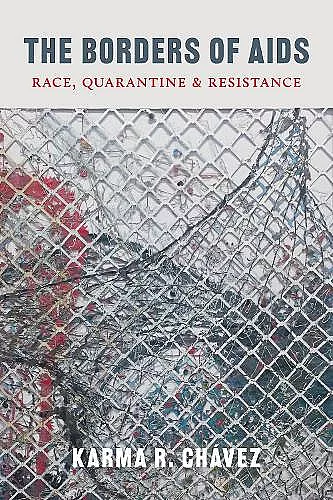The Borders of AIDS
Race, Quarantine, and Resistance
Karma R Chavez author Piya Chatterjee editor
Format:Hardback
Publisher:University of Washington Press
Published:28th Jun '21
Currently unavailable, and unfortunately no date known when it will be back
This hardback is available in another edition too:
- Paperback£23.99(9780295748979)

Winner of the 2022 Book of the Year Award, sponsored by the Latina & Latino Communication Studies Division of the National Communication Association
Winner of the 2022 Diamond Anniversary Book Award, sponsored by the National Communication Association
Unpacks the exclusionary politics of AIDS and traces little-known coalitions among affected communities
As soon as US media and politicians became aware of AIDS in the early 1980s, fingers were pointed not only at the gay community but also at other countries and migrant communities, particularly Haitians, as responsible for spreading the virus. Evangelical leaders, public health officials, and the Reagan administration quickly capitalized on widespread fear of the new disease to call for quarantines, immigration bans, and deportations, scapegoating and blaming HIV-positive migrants—even as the rest of the world regarded the US as the primary exporter of the virus.
In The Borders of AIDS, Karma Chávez demonstrates how such calls proliferated and how failure to impose a quarantine for HIV-positive citizens morphed into the successful enactment of a complete ban on the regularization of HIV-positive migrants—which lasted more than twenty years. News reports, congressional records, and AIDS activist archives reveal how queer groups and migrant communities built fragile coalitions to fight against the alienation of themselves and others, asserting their capacity for resistance and resiliency. Building on existing histories of HIV/AIDS, public health, citizenship, and immigration, Chávez establishes how politicians and public health officials treated different communities with HIV/AIDS and highlights the work these communities did to resist alienation.
"[I]mmediately urgent and immensely creative monograph."
(Peitho Journal)"In this important monograph, Chávez eloquently interrogates the concept of national belonging as it relates to race, disease, power, and morality in the US. She clearly and articulately expresses her core thesis of the alienizing logic of exclusion and offers a fresh and insightful contribution to existing histories of the early years of the ongoing AIDS crisis by repositioning themes of race and immigration into the central frame of this narrative."
(Connections)"[P]rovides a multifaceted narrative analysis of the dual policy frameworks of quarantine and immigration-related bans and detention as the United States coped with the rise of HIV/AIDS in the last quarter of the twentieth century. [Chávez's]work represents an admirable effort to integrate relevant voices from a variety of strata. Naturally, all historical work in the contemporary era should endeavor to do the same, but the tapestry Chávez weaves through her diverse employment of sources proffers truly unique perspectives in her field."
(H-Net Reviews)"This book made me hopeful about what scholarship can be and do. Chávez plays with time, drawing connections between the Reconstruction era, the AIDS epidemic, the COVID-19 pandemic, but always carefully. Chávez is confident about her political commitments, while not afraid to admit what she and we do not yet know. And perhaps most importantly, she allows oppressed people's freedom dreams to live on."
- Andrea Bolivar (American EthnologISBN: 9780295748962
Dimensions: unknown
Weight: 499g
264 pages